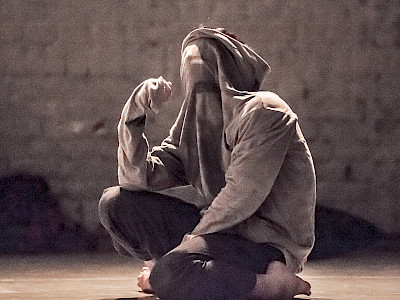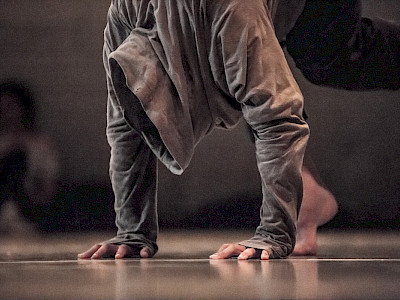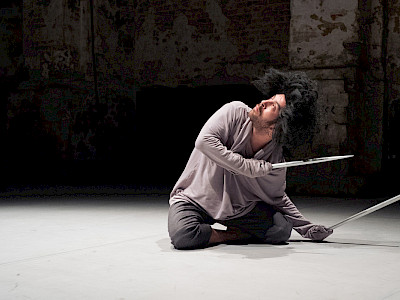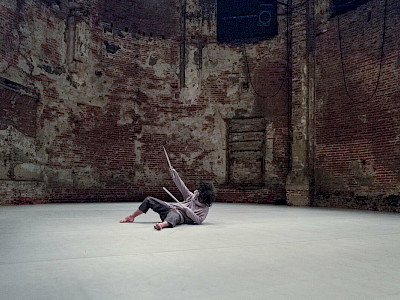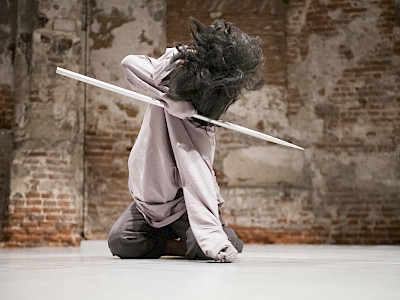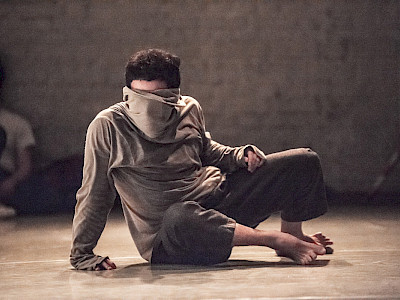11 — 13.05, 15.05, 16.05.2018
Although Eduardo Fukushima is still virtually undiscovered in Europe, he’s considered as an upcoming choreographer in his homeland Brazil. Possessing an abundance of cultural sensitivity inspired by his Italian and Japanese roots and his tai chi and street dance influences, Fukushima searches for the expressive and transformative power of movement. In Título em Suspensão he reduces his physical presence to that of a tranquil object: a leaf, a stone, lost on an empty white dance floor. Powerful sounds gently move the fragile body, lifting it in the direction of an overwhelming apocalypse. With Título em Suspensão, Fukushima lays down a particularly concentrated performance that simultaneously purifies and endures. A gem.
See also
Art & Populism – Brazilian arts under attack on 18/05 – 18:30
How to give space for the others who inhabit us? For fantasies, desires, dreams; for what is hidden in us?
Título em Suspensão, the most recent solo piece of the choreographer and dancer Eduardo Fukushima, was motivated by the construction of a figure that distorts his own image. The incorporation of materials that produces a new repertoire of movement, sound and senses, brings to light a strange body which deconstructs the idea of an ordinary human being. The relationship with the natural light and the duration of the cyclical phenomenon day-night. With the passage and immersion in different situations, places, residences. The opposition to the speed of São Paulo city, the stones of Dresden, the cold of Frankfurt, the grey sky of Düsseldorf, the witches and the prehistoric cromlech of Lesaka. The visible and the invisible are part of this suspension.
Rubén Ramos Nogueira about Título em Suspensão
Título em Suspensão [Title in suspension] originated from an invitation by the Columbian artist Mateo López to accompany an interactive sculpture exhibited at the Luisa Strina Gallery in São Paulo in 2016. Fukushima began his work there based on the similarity between the colour of the ground and that of the sky in São Paulo, assisted by the voice of Júlia Rocha, who accompanies him in this residence as assistant choreographer. The piece continued to develop in Germany later on, with work by the French musician Rodolphe Alexis, who now also accompanies Fukushima in this residency. In Germany, the team created sound recordings of Júlia Rocha’s voice together with sounds from the natural landscape around the residency space. Rodolphe Alexis now uses these sound resources as the raw material of his musical composition, an audio landscape accompanying the new direction this work is taking, coherent with and embedded into Fukushima’s movement, but always serving the choreography, and following on a step behind. Paradoxically, as Fukushima pointed out during our conversation, he had to travel to Europe from his native Brazil, a country of exuberant landscapes, in order to encounter the natural world. It was a two-stage trip: first to Germany, and then to this wild Navarra enclave. Admittedly, although a Brazilian, Fukushima like so many of his compatriots of Japanese origin was born in São Paulo, a megacity where it is no easy matter to encounter nature. It is much simpler to find it with a helicopter.
(…)
Unlike his previous work, this time the choreography on stage is not autobiographical, but is somewhat set apart, moving away from itself to take a sedate and contemplative journey (until it explodes into noisy, quivering frenzy), perhaps with a rather outward-looking gaze. A journey which sometimes evokes the lingering scent of some of the Eastern techniques in which Fukushima was trained.
Just as Fukushima had to come to Europe in order to encounter the natural world, yesterday I needed to encounter the work of a Brazilian in order to be reminded of a type of creativity which perhaps through some remote links and shared references, continues to develop in other parts of the world.
This work (which as Fukushima himself told us, will not be entirely complete until it has been staged a score of times) is one of those which, as we enter into and connect with it, intensifies sight, smell and all our other senses, and thus, as we once more leave what we call reality, what is awaiting us outside, perhaps we experience the illusion that everything is new and different to whatever we left behind. And perhaps, if we are now changed, this is no illusion.
Rubén Ramos Nogueira
Creation & dance
Eduardo Fukushima
Music & sound
Rodolphe Alexis
Dramaturgy
Júlia Rocha
Light
Hideki Matsuka, Igor Sane
Costumes
Eduardo Fukushima, Alex Casimiro
Thanks to
Mateo López, André Menezes, Beatriz Sano, Eduardo Bonito
Production
Carolina Goulart
Presentation
Kunstenfestivaldesarts, Les Brigittines
Coproduction
Sesc (São Paulo)
With the support of
Galeria Luisa Strina (São Paulo), Hellerau (Dresden), Künstlerhaus Mousonturm Frankfurt am Main, TanzHaus NRW (Düsseldorf), Festival DNA (Navarra), juntamente com Rolex Mentor & Protégé Arts Initiative (Geneva)

